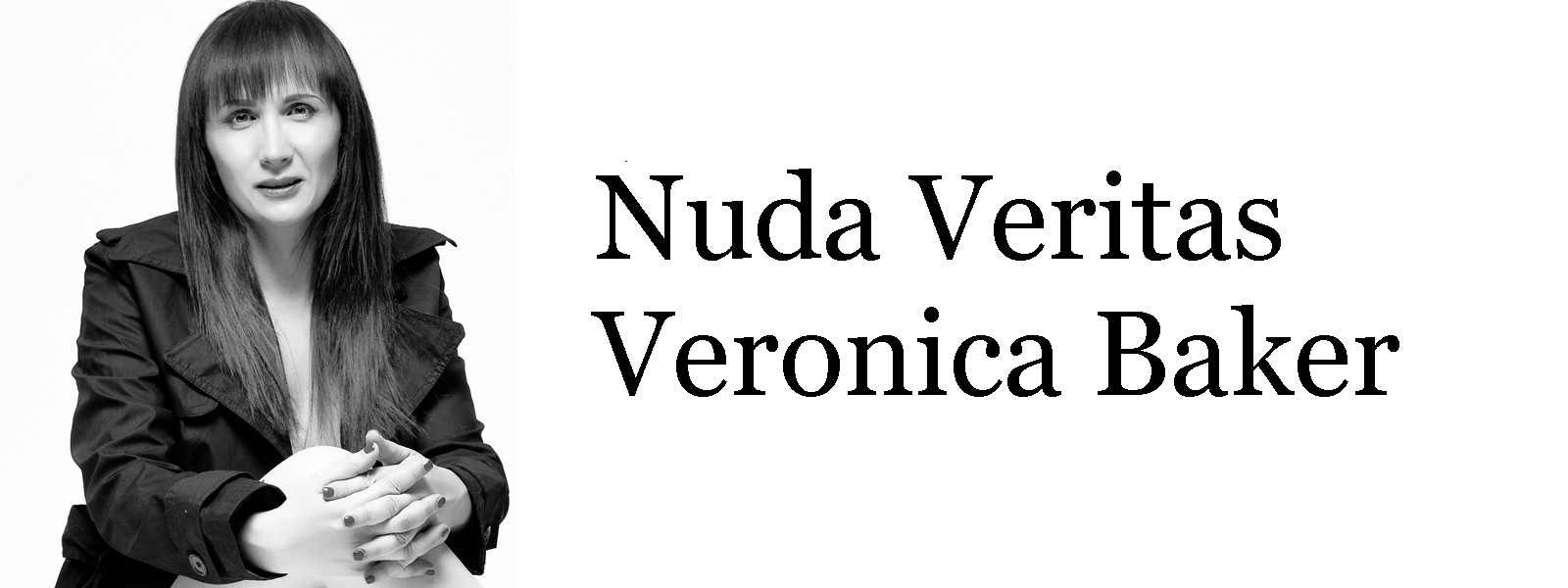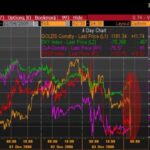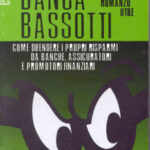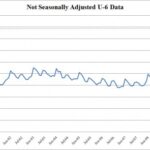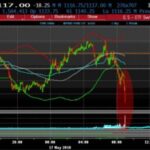Giugno 2, 2010 EcoAnemia
Situazione sempre più drammatica
La giornata di ieri è stata caratterizzata dall’ennesimo intervento congiunto della FED insieme alla SNB a sostegno dell’€, che al momento evidentemente non può rompere contro USD quota 1.21 e contro CHF 1.40 :
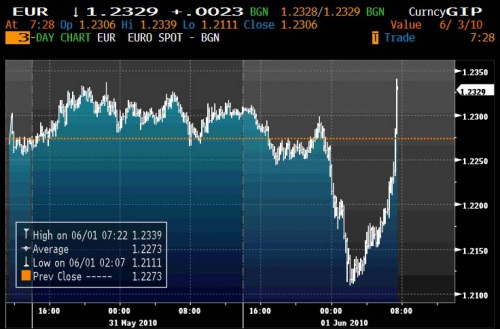
L’immagine è eloquente, 200 Pips in un’ora, non facendo altro che confermare le parole del ministro delle finanze tedesco Rainer Bruderle, che ha candidamente ammesso che il Forex in questo momento è manipolato (e che quindi la direzione nel medio/lungo periodo è abbastanza scontata).
Infatti, è interessante notare che ormai gli indici si muovono esclusivamente sulla base degli interventi esterni, e non brillano più di luce propria, ecco come appariva in chiusura di seduta ieri lo Spoore, dopo che in precedenza c’era stata una copiosa distribuzione :
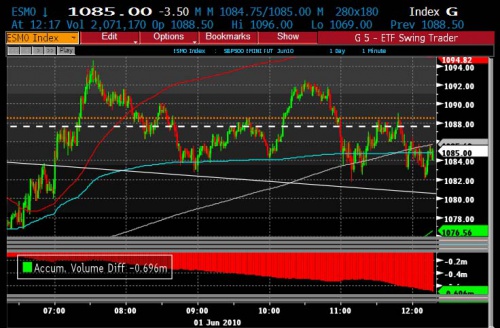
Mattina e primo pomeriggio.
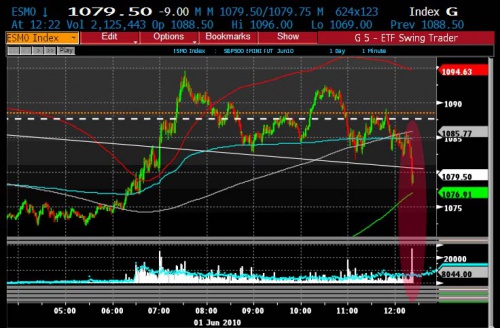
Ultima ora, dove si sono concentrate le vendite.
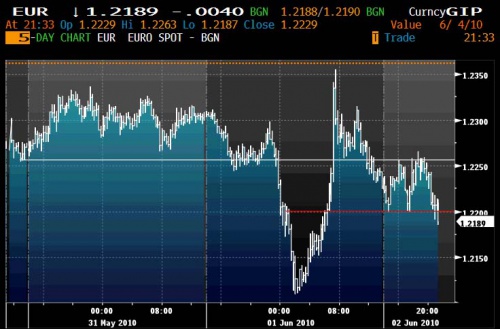
E l’€/$ non ha fatto altro che seguire fedelmente la traiettoria seguita dallo S&P500, od il contrario, il concetto è il medesimo ed è direttamente proporzionale come correlazione, questa figura è ancora più eloquente :
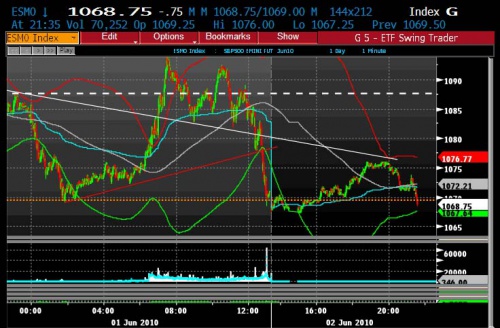
Nel frattempo, il mercato dei CDS ci informa che l’Italia ha raggiunto i 250 Bps (+50 Bps in un giorno, +20% in termini percentuali), valore che inizia ad essere decisamente preoccupante.
Ma uno sguardo più accurato ci mostra che la situazione inizia a farsi decisamente pesante soprattutto per l’UK – la cui moneta sta pericolosamente iniziando a rafforzarsi, per altro – in una situazione in cui si inizia davvero ad avere paura della insolvenza di qualche altro stato “periferico” :
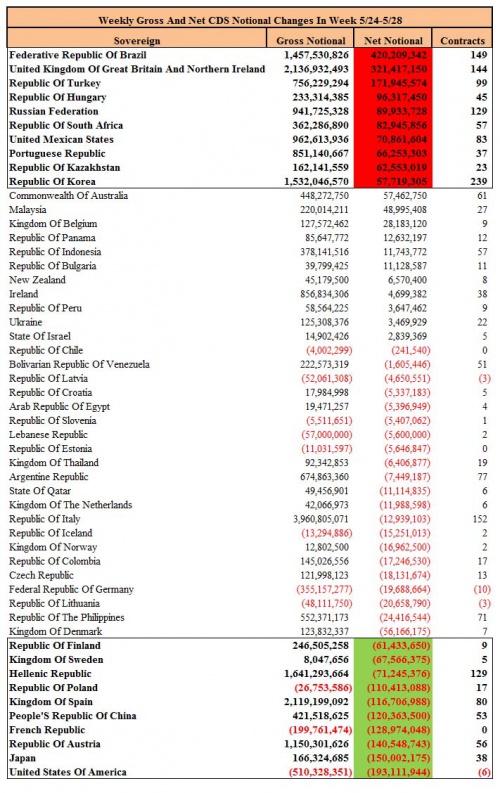
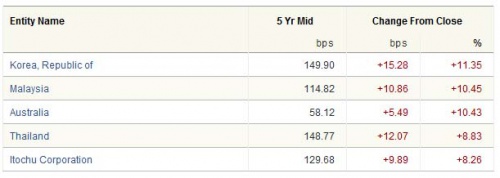
E’ interessante in ogni caso notare come il mercato dei CDS sia mosso quasi esclusivamente dalla speculazione e non dai fondamentali, infatti non appena i CDS di un paese raggiungono valori elevati – e soprattutto quando i governi degli stati sovrani annunciano manovre di austerità – si prende profitto, infatti l’elenco dei top-derisker precedente è assolutamente chiaro come il sole.
E che in questo momento gli investitori istituzionali non gradiscano comprare scadenze di Bonds superiori ai 3, massimo 5 anni, lo dimostra l’andamento di ieri dell’asta emessa dal governo brasiliano, andata deserta per quanto riguarda la scadenza del 2021 ma andata a ruba per le scadenze del 2012 e del 2014 :
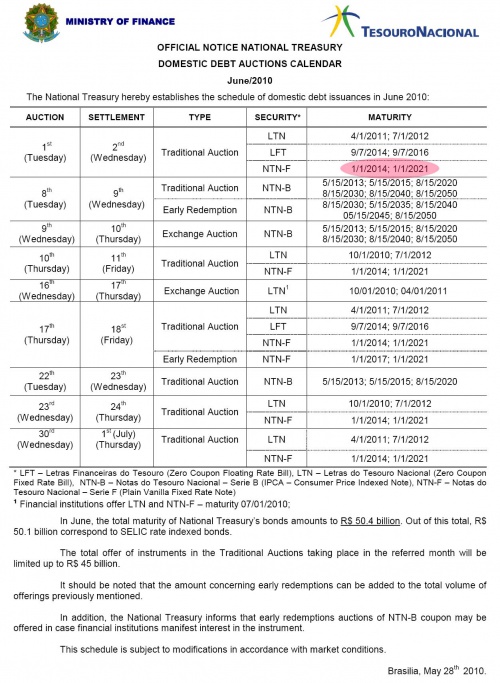
In effetti, visto che la scadenza del 2012 ha uno yield molto appetibile del 12.2863%, c’è da comprendere i motivi.
Interessante anche in questo caso notare che il Real – proprio sull’onda dell’asta 2021 andata deserta, si è per la prima volta da mesi indebolito contro tutte le principali divise mondiali, ecco contro USD :
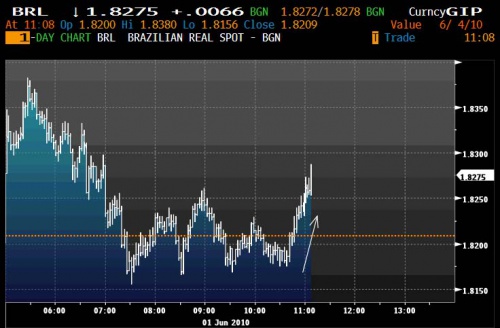
Nel frattempo, sul fronte economico le notizie continuano ad essere sempre più negative, come questa mattina ci ricorda Bloomberg :
Ichiro Ozawa, secretary-general of Japanese Prime Minister Yukio Hatoyama’s party, asked Hatoyama to step down from his post, Yukio Ubukata, vice secretary- general of the party said in a TV Asahi program today.Ubukata said he expects both to resign before an upper house election next month. Hatoyama refused to resign during a meeting of senior party officials yesterday, Kyodo News reported.
There were about 980,000 sell orders “at one point,” according to Tatsuya Kamiki, executive officer of the Osaka Securities Exchange. Orders for the contracts were placed at 9,690 yen and 9,700 yen, according to exchange data.
At the lower price, that values the orders at about 9.5 trillion yen ($104 billion), or about 3 percent of the total market value of the first section of the Tokyo Stock Exchange, according to Bloomberg data.
“There was quite a lot of disturbance in the futures market this morning,” said Masanori Ikunaga, head of domestic stocks at Sumitomo Mitsui Asset Management Co. “As the speed of orders and trades increases at the stock exchange, there will also be potential for these types of risks.”
Piccoli Jerome Kerviel crescono e si moltiplicano in tutto il mondo.
E mentre in Europa l’unica preoccupazione di S&P è di downgradare per l’ennesima volta le banche spagnole, seguendo il medesimo clichè già utilizzato per quelle greche :
On June 1, 2010, Standard & Poor’s Ratings Services placed the ‘A/A-1’ long-and short-term counterparty credit ratings and all issue ratings (except those on covered bonds and state-guaranteed debt) on Spanish savings bank Caja de Ahorros y Monte de Piedad de Madrid on CreditWatch with negative implications.
Le stesse banche spagnole corrono naturalmente ai ripari chiedendo un (nuovo) supporto governativo (ed eventuali fusioni con istituti più grandi, quelli “too big to fail”) , come ci spiega nei minimi termini Marketwatch :
Up until a couple of weeks ago, the term “caja”, which literally means box or chest, was not such a familiar term with global investors, but many are now getting a crash course as news is rapidly spilling out from the sector.
Spain has 45 savings banks and an increasing number are now in merger talks — ailing from the collapse of the housing market — amid some estimates that the country has 30% more bank branches than it needs.
Pressure to merge and restructure has come from the International Monetary Fund and the Spanish government.
The government has set up a Fund for Orderly Bank Restructuring, or FROB, to speed along this process, and given the savings banks until June 30 to ask for the money they need.
The fund has a total value of €99 billion and is funded with €9 billion of capital and up to €90 billion of government-backed debt.
Inevitabile il finale.
Mentre anche sul fronte Medio-Orientale la situazione sta rapidamente precipitando, con un Israele che sta dando il peggio di sè negli ultimi giorni , da Reuters :
Israeli military aircraft came under anti-aircraft fire over Lebanon on Tuesday but there were no casualties, an Israeli security source said.The source said the fire was aimed at Israeli planes on reconnaissance flights over southern Lebanon.
An Israeli military spokesman had no immediate comment.
Tension has risen in the region since nine people were killed aboard a Turkish-backed aid ship heading for the Gaza Strip when Israeli commandos seized the vessel in Mediterranean waters on Monday.
Ed a complicare le cose, non solo da un punto di vista del terribile disastro ecologico (probabilmente il peggiore della storia) nella Louisiana causato dalla marea nera fuoriuscita dalla piattaforma della BP, arriva l’abbastanza scontato crollo del titolo British Petroleum, ieri -14% (trascinando a picco tutto il comparto americano del settore, perdite dall’8% all’11% per Halliburton, Schlumberger, Baker-Hughes, Anadarko) .
Il vero problema è che questi titoli solitamente sono considerati ultrasicuri, ed infatti sono solitamente sovraesposti gli istituzionali :
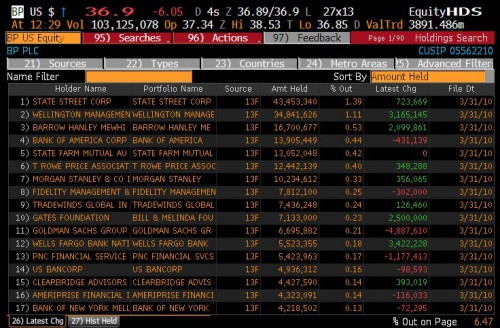
Zerohedge ci ricorda i maggiori azionisti di BP :
#1: State Street, with 43.4 million shares has lost $260 million today, #2: Wellington, 34.8mm, $209 million, #3: Barrow Hanley, 16.7mm, $100mm; #4: Bank of America, 13.9mm, $83mm; and #5: State Farm, 13mm, $78 million.
That’s half a billion in losses for the top 5 holders today alone.
And this list doesn’t even include Anadarko, Transocean, or Halliburton.
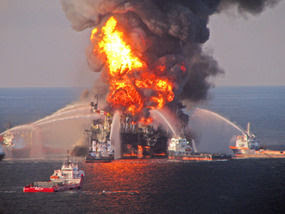
E questa è la conseguenza più evidente :
Billions of pounds were wiped off the value of pension funds yesterday as shares in BP slumped dramatically because of the Gulf of Mexico oil spill. One of Britain’s biggest companies and a key indicator of its economy, the oil giant suffered its worst one-day share fall for 18 years.
At its lowest point, the company’s share price was nearly 17 per cent down, although it recovered slightly by the close of trading. Even so, £12billion had been wiped off its market value.
Last night experts were warning that the company had “the smell of death about it” as fears grew that the disastrous leak off the Louisiana coast could continue for another two months after the latest attempt to stem it failed.
Market experts warned that the extraordinary decline of the City heavyweight – a key stock for many UK pension fund investments – would inevitably leave British pensioners poorer.
Pensions expert Alan Smith, chief executive of financial planning firm Capital Asset Management, said: “This is a disaster for BP and most pension funds will undoubtedly have exposure to BP and will be affected. If BP were to halve in value this could lead to pension values going down one or two per cent.
Questo è il vero disastro che si sta compiendo, BP era una delle azioni preferite dei mutual funds, alti dividendi e grado di rischio molto basso , il sistema pensionistico inglese ora è realmente a rischio, considerando anche che l’UK non naviga certo in acque tranquille, come abbiamo visto in occasione proprio dell’aggiornamento del giorno sui CDS.
Pare quindi incredibile (ma non troppo) notare che tutti i più importanti strategist delle banche d’affari USA abbiano ancora reiterato i loro ridicoli target per il 2010.
Anche se – ripeto – fare previsioni a lungo termine in questo modo a mio modo di vedere equivale a fare le previsioni del tempo a distanza di 3-6 mesi, cioè hanno valore nullo.
Ad ogni buon conto, lo Spoore è a livelli piuttosto elevati di ipervenduto, un rimbalzo da qua (o quantomeno a partire da questa area di resistenza) ci può stare.
